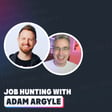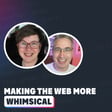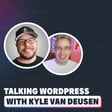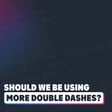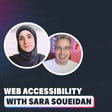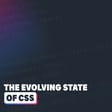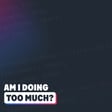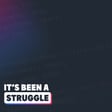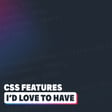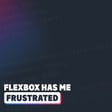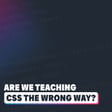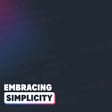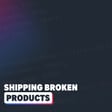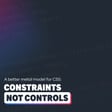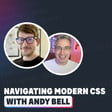Become a Creator today!Start creating today - Share your story with the world!
Start for free
00:00:00
00:00:01

Selective Learning
In this episode, I discuss the concept of selective learning, emphasizing the importance of focusing on foundational skills rather than getting distracted by the latest trends. I explore the impact of social media on learning choices, the significance of understanding job market demands, and the role of documentation and community support in the learning process. I also critique the limitations of learning roadmaps and encourage listeners to build projects that align with their learning goals.
Transcript
Introduction to Darnell Musings
00:00:00
Speaker
Hello, my friend and friends, and welcome to my podcast, Darnell Musings. My name is Kevin, and in this podcast, I talk about whatever is front of mind for me in any given week, usually in some way that's related to front-end development.
Understanding Selective Learning
00:00:11
Speaker
And today I want to talk to you about selective learning. And one of the reasons I wanted to bring this up is because of what I talked about last week, which was when we can become overwhelmed by having too much to either keep up with or too much to learn.
Managing Distractions in Tech
00:00:25
Speaker
And this sort of feels like a nice follow up.
00:00:29
Speaker
And this idea of selective learning and it's, I don't think it's anything new at all, but it's selecting what we should learn and what we should focus on instead of trying to learn everything
Foundational Skills vs. Trendy Tools
00:00:41
Speaker
that we see. And I definitely struggle with this a little bit because I get sidetracked very easily when I see a shiny new thing and I want to go and play with it.
00:00:50
Speaker
mainly when it's related to CSS, like, oh, I should be working on this tutorial on how collapsing margins work. But look at that, we have a shiny new feature, I'm going to go play with that instead. And so ah I do that, but in a way, I'm in a position where I can get away with it, because then I can just make content around that shiny new thing instead. ah Though I am trying to do a conscious um What's the word?
Social Media's Influence on Tech Trends
00:01:15
Speaker
I'm trying to do it conscious focus on certain topics these days and trying not to get too distracted and focus too much on the new stuff, even though it's it's fun to talk about and look at and explore. and But actually on that note of, oh, look, the shiny new thing, I think one of the best ways to avoid
00:01:34
Speaker
feeling overwhelmed or and to focus on the things that you should actually be focused on, I guess is the right word, ah is try not to feel FOMO when we see what others are talking about in social media. and I've seen this a lot of times and I'm probably partially to blame for this as well where i because I'll talk about something that's relatively new that probably isn't super well supported by browsers yet, that other people will see that and be like, oh, that's really cool, shiny new thing, and then they go and dive into it as well. And of course, it's not just related to CSS when this type of thing happens. This could be very common with a lot of just front-end development stuff, whether it's a new JavaScript framework or a new, whatever it is, there's so many new features and new things that are constantly coming. It could be just something that
00:02:24
Speaker
excites you that you want to play with and then there's just this long ever never-ending list and social media can be really dangerous for this because there's always people talking about what they just discovered and they want to share it because they're excited about it and it can feel like there's more going on than what's actually happening and it could feel like there's definitely times where everybody's talking about the same thing But it's only the people that talk about all of this stuff constantly. They're all talking about it. And so you feel like, Oh, this must be the thing that's going on. When in reality, it's just not as big of a topic as you might have assumed. And the one that comes to mind for me with this specifically is Dino. I remember when it first came out and it was going through the hype cycle.
Assessing the Relevance of Trends
00:03:15
Speaker
everybody was talking about it and I know why everyone was talking about it because I talk with other youtubers that do front-end development stuff or just web development in general and every video that any of them would put out that was talking about Dino was exploding like number one video for them doing super well and then someone else would try and it would do super well and so all that did was encourage these people to continue making videos on it and what that did is it made it seem like this really big topic that was taking over because all of the people, the I guess influencers, ah were talking about it
00:03:50
Speaker
and it made it feel like it was taking over when it didn't and it's not to say that it never will i think it's going through a very. Slow maturation process and it's a really cool thing that probably will continue to gain traction very slowly sort of how we generally see these things happen.
00:04:09
Speaker
So I would say when you see a whole bunch of people talking about something, take note of it, especially if there's lots of hype, take note of it. See, like, OK, that's kind of cool. ah I'm aware of it. I'm going to stay aware of
Core Languages vs. Frameworks
00:04:19
Speaker
it. But I'm going to check back in three months or six months and see where things are still going and see, has the hype died down? Is this something that people are actively using right now and and see what comes up? It could even just be like if you use like, I don't know, for me, I use Google. So I just tell it to remind me of something in six months. And then it does. And then I'm like, oh yeah, I wanted to look into that. ah But you could just be adding a note on your calendar or whatever it is that you use to keep um up to date with things, just a or reminder system or whatever you might have, or just a mental note that I know if I did a mental note, I never remember it. But I think, yeah, when it's the shiny new things coming,
00:04:57
Speaker
If you have the time, go and play with it. See what it's all about. But if it's like, oh man, everybody's getting into this. This is really cool. I really need to learn this. You might and actually probably don't. So if it's new, you you don't need to learn it right away. That's for sure. So ah taking note of things and just being like, okay, maybe this will be something I might have to learn later on, but ah I'll just be aware of it. I think it's a really important thing that you can do.
00:05:22
Speaker
And the other thing that I think is really important is differentiating between foundational skills and trending tools. Because i I'm biased here. I teach vanilla CSS for the most part. I'll touch on Sass and a couple of other things. But I think I'm biased on this because I think it's so important to learn the foundational skills.
Aligning Learning with Career Goals
00:05:49
Speaker
And I'm always going to say not or I'm always going to say learn the base languages first and then build up from there.
00:05:59
Speaker
Whereas a lot of the trending things are built on top of other things and then it just becomes If you're learning those first, it can be hard because you don't know when you're learning the language, like the core language, or are you learning features of that thing? React is similar, right? Where, am I learning React or am I learning JavaScript right now? And what which of which am I using? It can be really hard to tell. That was really awkward how I said that. i Sorry about that. Which of which, I'm not sure what that means. But hopefully you know what I mean. um But yeah, on that,
00:06:31
Speaker
the and it's all It's a bit more than just that I think as well. of Because with the core languages like CSS, which I'm focused on, like there's the new trending things coming from it that are going to get baked in and become foundational skills potentially. But I'd still say like it's it's really important just to like, is this something I need to know or is this a cool shiny new thing again? And being able to differentiate those and that becomes a lot easier the more experience you have as well.
00:07:00
Speaker
I think, anyway. It can be easy to get sidetracked, but you're able to differentiate. I can't say that. Differentiate? That sounded better. You're able to differentiate when something is more of a foundational skill that you should probably focus on. Whereas when you're new, it can be hard to know which way to go. And I will say, and I always say this, that while I always say that you should learn the core languages first,
00:07:30
Speaker
Back in my day, I learned jQuery before I learned JavaScript. And I think it's fine to, if you went down a path where you learned React or you learned something else before you learned JavaScript, there's no harm in that at all. it just It does take time at one point to unpack the which was which along the way. I know that happened to me with jQuery.
00:07:49
Speaker
when it was like, okay, I'm going to start learning just JavaScript. I'm like, oh, a lot of what I was doing was JavaScript, but it was a little bit different or this is why I had to do it that way or whatever it was. And then I got better at things, but you do have to sort of unpack things a little bit. But if that's how you got into it, I think that's completely fine. And You can be really good at what you do. it's a It's easier to pivot and understand new features that are coming or changes that are made to these different things that we're using to write JavaScript or built on top of JavaScript type of things when you have strong foundational skills.
00:08:21
Speaker
Another thing, and maybe the most important one for anybody, it could either be, I was gonna say this is the most important one for anyone who's currently looking for a job or working their way up to a career and they don't have their career yet, but this could definitely apply to people that are already working, but ah it's to look at your, base your learning path on your career goals, basically.
00:08:49
Speaker
which sounds overly simplistic maybe, but like people always ask me what if they should learn React, for example. And I say, probably, but maybe not, and look at, in your local area, because I know everybody wants a remote job, realistically, you these days there's a big shift in not have 100% remote work. It still exists, it's still out there, but look locally, because that's probably where you're going to be getting a job.
00:09:19
Speaker
and see what's in demand. Look at jobs that are out there right now and don't necessarily only look at the design agencies or not design agencies, but like the the web development agencies and stuff. Look at companies that also have in-house teams because there's lots of those.
00:09:35
Speaker
and Those are also the ones that can sometimes go under the radar when it comes to job postings and stuff. So it can be another way to not end up in one of those things where you have a thousand people applying for the same job. And I apologize. So I knocked my mic there.
00:09:50
Speaker
um The what we want to do, though, or what you want to do is yeah look at the job market and see what's going on and see what's in demand in your area. And you might say like, oh, 70 percent of the job postings are asking for react and of course when you're looking at the job postings they over ask for stuff so do be a little bit careful but just get a big picture and look for trends across the job postings but yeah you might see 70% of them are using react but then that other 30% it could be a large chunk of them are in something like angular still or they might be i don't know updating and using other things that you might not expect and those are i think pretty good opportunities because you might find that
00:10:33
Speaker
Most, you know, 30% of the people looking for jobs won't be focused on those types of things. So if there is this large, smaller chunk, that could be something that could be like, oh, I'm going to actually build up some skills in that, whatever it is that ah can help me out. And it could be something unexpected because local markets can be a little bit different at times.
00:10:55
Speaker
And you're also, like, there's a lot of old companies, or not old companies, but companies that have old code bases that they're, you know, they're staying up to date with things, but they're not built on React necessarily. These days, even the old ones can potentially be, but I have a friend who's very successful, who's an Angular developer. And because a lot of the jobs he finds, it's ah these very, very big companies and government agencies that built everything up and with Angular and it's these massive things and they're not going to change it because there's a new JavaScript framework in town, right? That's what they have. That's what they're going to continue using. ah So definitely look and see what's happening in your local market. And again, this is really good if you're looking to learn and enter the job market. But if you're already in a role and you want a better role,
00:11:47
Speaker
Again, look at whether it's within your own company or other companies or talk to other people and find out like see what, see what other things are out there. Where do you want your career to be in five years from now or 10 years from now or whatever it is or what you want your next role to be. Um, or if you're just looking to get out of your job, whatever it is.
00:12:04
Speaker
look at what is in demand and base what you're going to be learning to on that because having your experience is great, but you might need other skills or there might be a hole in the market somewhere where you can be like, and if you're already working, it's probably going to be a much smaller thing that you need to focus on. But yeah, um looking through all of that can really help out. And I said all of that. I just mean check out the job market.
Evaluating New Tools
00:12:28
Speaker
and don't rely on, again, the social media hype on anything to like to dictate your choices on what you should be learning. ah Another one that can help that's a little bit silly, but if you're looking into something bigger, like this new thing that you want to learn, and this happens more with the shiny new things,
00:12:46
Speaker
ah for for JavaScript frameworks and other things like that. But look in the documentation and see if it's going to be easy to learn or not. That might sound really silly, ah but you might find that there's really bad documentation on something. That could be a double-edged sword. It could be, I'm going to get involved in this product or project, I should say, not product. I'm going to get involved in this project and help them with their documentation. And that could actually be a really cool thing to put on your CV. and Yeah. And you'd also get good at learning that thing because you're working on the documentation, everything else. So that's an option. I'm not saying you should do that. It's a lot of work and it might not even be feasible.
00:13:24
Speaker
ah But that is one thing, but the more realistic thing is you look at the documentation and it's really bad. And then you're just like, this is going to be really hard to learn because there's poor documentation and there's not a lot of other people talking about it. And while it looks really cool, it's not ready for prime time yet. And ah it's going to I'm going to be spending way more time than I should learning this.
00:13:45
Speaker
because it's all going to be trial and error and figuring things out on my own, which I don't want to do. And these days, there's also like discord communities and other things that are around it, like all of these different things that pop up. So check out the discord community too, because maybe the documentation is bad, but as a very ah friendly and helpful discord community and that can balance out a little bit.
00:14:05
Speaker
um But yeah, just be aware of like am I might be able to learn this thing that I want to learn or you're going to be able to learn it. But is it is there extra roadblocks there in front of me that might get in the way?
Using Surveys for Long-term Trends
00:14:17
Speaker
and The other thing I would say is look at really long-term trends. and It's a little bit boring maybe, but you can use like the state of ah JavaScript survey. There's a lot of surveys these days for web development. Look at them and see what the general trends are.
00:14:35
Speaker
long term, like year over year. And one example I can think of here is TypeScript is just gaining tons of traction year over year. And that might be like, oh, I wasn't planning to learn TypeScript, or I know it a little bit, but I wasn't really you know it wasn't top of my radar because I wanted to get into this other framework instead. And then you see like, well, all the frameworks are starting to focus on that and all the job opportunities are looking for that. And it seems to be that it's just always gaining traction over the last four years.
Flexible Learning Paths over Roadmaps
00:15:09
Speaker
The usage of it just keeps going up. Maybe that's what I should focus on. And you might be able to detect other trends of things that aren't quite as big as TypeScript, but you might be seeing the framework that went from
00:15:20
Speaker
fifth place to fourth place to third place in terms of usage and then be like, oh, maybe I'm going to learn that because the next two years, you know, it's on an upward trajectory. And in the next couple of years, that might be very much in demand. And so, yeah, there's options there. And definitely I would look at that. And it could also just be the opposite, where it's like, oh, this thing was popular for the past four years. But last year it took a little dip. And in the most recent survey, it's its while it's still very much in use, you can just see it start. that that it's It's getting to that beginning of the decline and it might just be a little bump in the road and then it goes back up. You never know. But looking at the long-term trends can definitely help.
00:16:02
Speaker
get an idea of where things are headed and it's more stable doing that than like what's happening last month, right? So ah that can really help out. And the last thing I want to talk about is the idea of roadmaps. And I think general roadmaps can sort of be helpful, but they're very flawed because when you find the roadmaps that are online, they have to teach, not teach, they have to provide things in a specific order.
00:16:29
Speaker
But a lot of the things that we do, you can't learn in in that specific order. ah You're usually doing multiple things at once, but it really, just because of the way a roadmap works, is it's like, do this, then this, then this, then this. That's what it literally is. Four, there's always gonna be a lot of crossover and melding between those. So it can make it can it can build these false isolation between things, I guess, in your head. That's not the right way to say it, but I can't think of the right term. but Yeah, you're just it can makes things feel like they're step by step when really it's just more of a flow, I guess, where things milled into each other a lot more. And also, it really depends on what you're working on. And there's either the roadmaps that are way too detailed and say like they're they're saying learn this, then this, then this, then this. And they're putting like 10 things there when you only might need three of them.
00:17:23
Speaker
like depending on what you're doing. And this is where I'd say look at the job market, look at what you're doing and everything else. And some of the roadmaps also these days recommend older things like they're just added in there because there's something that was used for a long time that's not so popular these days. And and that can be, it just gets in the way a little bit, I think. And then there's the other roadmaps that don't have enough steps along the way or the worst ones that actually give specific timelines of like, this should take three days.
00:17:52
Speaker
yeah If you're looking at it with a timeline on there, it's either going to be way too long or way too short. And one person will tell you it's that that step is too long and the next person will tell you that step is too short. How many hours a day are you putting into it? What's your background before you started this? Is it just clicking for you or is it not clicking for you? You can't put times on it. And people ask me for this type of thing. And I've talked about it before why I don't like learning roadmaps.
00:18:20
Speaker
I just find they set unrealistic expectations. And while the, I think looking at it as a big picture thing can be helpful of like, this is the general flow that I might take to get from here to here. And these are the different types of things I need to learn. And that's definitely useful when you don't know anything of what you need to learn. So I'm not saying don't look at roadmaps. I'm just saying be very wary of roadmaps because there's definitely steps along the way that can be skipped.
00:18:47
Speaker
And then there's, and you don't know what they are because you're learning, so it's it that can be really hard. And then the timelines that they put on them, if they did put timelines on them, are just, it's the person who's creating it who has years of experience going, yeah, that should take three weeks to learn, just because they know that people are looking for timelines. You can't put a number on any of this. I'm still learning new things about the box model in CSS, and I've been teaching it for 10 years, right? So it's like, you're never going to be a master of anything, and that's fine.
00:19:17
Speaker
and And you're definitely not going to be it within the two weeks that the framework said you should learn this topic in. And I think that's what happens is people feel like with these things, they have to learn one step before they they have to be really good at that step before they can move on to the next step, which isn't the case. Everything relies on that. And as you learn other things, it makes connections to what you were learning before. And it all comes together and everything. So just Yeah, with step-by-step things, be really
Conclusion and Encouragement
00:19:45
Speaker
worried. Build projects and those projects are going to dictate what you need to learn because you're like, oh, I need to be able to do this to accomplish this. I don't know how to do that, but let's figure out what I need to learn to be able to accomplish this thing I'm trying to do. And you build your own roadmaps for the specific things, or not roadmaps, but learning paths of the things that you're trying to learn.
00:20:06
Speaker
but Yeah, so that's it for this week. I hope you enjoyed it. I hope um that was useful for you Thank you very much for listening and until next time of course Don't forget to make your corner of the internet just a little bit more awesome

